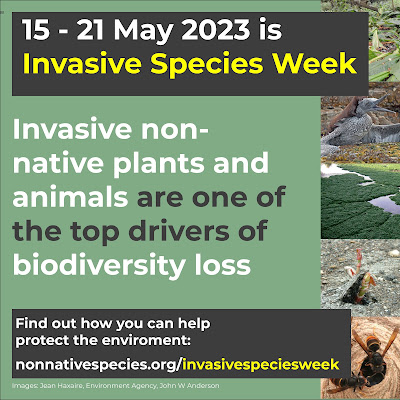 |
| American Skunk-cabbage: this invasive non-native is on the increase Image: K. Walker |
This year's Invasive Species Week runs from 15th to 21st May, and here are three ways that you can get involved.
1. Book for this talk by Dr Oli Pescott from the Centre for Ecology & Hydrology, about some of the non-native plants recorded for the recently-published BSBI Plant Atlas. Did you know that of the 3,495 species recorded, only 1,692 were native to Britain & Ireland? So for the first time, we have more non-native than native species on these islands! If you want to check if a plant is native or not, just look it up on our Plant Atlas website, where you will also be able to find out if the plant is on the increase or in decline (and the reasons why). Also check out the Atlas summaries (free to download by following the links on this page) to read about how our flora is changing and which species are very much on the increase.
 |
| Floating pennywort: clogs up waterways; a huge amount of money is spent trying to eradicate this invasive non-native Image: Crown copyright 2009 |
2. While some non-native species are invasive, the majority are benign and many of those non-natives are actually important for pollinators and other wildlife; some of our native species can also prove invasive - there isn't a clear-cut message of 'native good, alien bad'. That's why resources like Plant Atlas 2020 are so important, helping us all to drill down and find out more.
But for next Sunday's Wild Flower Hour on social media, the focus is very much on those non-natives that are proving problematic. Why not join us at 8pm on Sunday 21st May, to see images of those problem plants? And keep an eye on the #INNSweek hashtag for more info.
3. Check out this 'What Can I Do' page for lots of helpful info about invasive non-native species: what they are, how they are spread, and what action is being taken to reduce their impacts. You'll also find lots of tips on how we can all make sure that we don't inadvertently contribute to the spread of invasive plants. By following the 'Five Simple Things I Can Do', we can all make sure that we are part of the solution rather than part of the problem!

No comments:
Post a Comment
Please leave a comment!